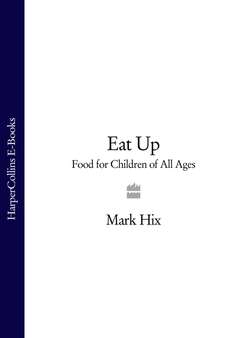Читать книгу Eat Up: Food for Children of All Ages - Mark Hix - Страница 8
Shopping
ОглавлениеBecause I love food I actually enjoy shopping, though I am the first to confess that I am not usually pushing a trolley full of nappies and cornflakes. I like to go to Covent Garden market every Tuesday morning at 5am to find out what’s available. Interestingly, I have only ever bumped into one other chef there, though if you believe the press the place should be crawling with them. Many chefs rely on their suppliers to bring new foods to them but I find that wandering around myself keeps me in touch and also gives me fresh ideas about what to cook. If I invite people to dinner, they are often surprised when they ask me what I am cooking and I say that I don’t know because I haven’t been shopping yet. But if I try and plan dishes in advance I often can’t find one of the key ingredients anyway, so I like to keep an open mind. If I find a good main ingredient I can usually match the rest of the meal around it with what’s available. In the same way, I quite often find myself creating dishes with what’s left in my fridge at home. Lots of well-known dishes have been invented in this way – for example, Caesar salad. Who would ever think of matching anchovies, Parmesan, garlic, romaine lettuce and croutons? That’s what Caesar Cardini did when guests turned up at his hotel unexpectedly and he had nothing to feed them.
Though supermarkets nowadays are ahead of the game, unfortunately they are often ahead of the seasons, too. I find it sad that, just as we are all becoming more sophisticated about food, our awareness of the seasons is being destroyed. Supermarkets aim to supply everything all the time, regardless of where it comes from, what the season is, whether it is ripe, and, most important of all, whether it has any flavour. Yes, in theory, it’s great to be able to cook with anything you like all year round, but what’s the point if it doesn’t taste of much? Certain foods are only worth eating in season, such as tomatoes and berries. As a child, I used to look forward to the appearance of my grandfather’s first strawberries in June, but now that we can eat imported ones all year round – greenhouse-grown and tasteless – the magic has gone. So although I envy kids today the huge variety of food they can pick and choose from, at the same time I worry that everything is beginning to taste like everything else – is it any wonder they get bored?
I want to keep alive for my children the tastes and scents of the food that I enjoyed as a child and I believe the best way to do this is to buy seasonally. When it comes to organic food, I have yet to be convinced that it always tastes better. Some organic produce has a superb flavour – chicken, eggs and carrots are obvious examples – but too much of what’s available consists of disappointing and expensive foreign imports. The best way to buy organic is to subscribe to a box scheme, where organic produce is delivered to your door. In this way you can be sure that what you’re getting is fresh and locally produced, and prices will be more reasonable because you are buying direct from the producer. Farmers’ markets can be good sources of organic food, too.
In terms of health, organic food is undoubtedly a better choice for children, since it is grown without the use of pesticides, and animals are raised without routine antibiotics and growth promoters. Although ‘safe’ levels of toxins have been established (but not always adhered to), these are based on adult intake. Children have less body mass and so consume a proportionally higher amount – particularly babies, for whom fruit and vegetables are a major source of nutrition. At the same time, their immature immune systems are less able to cope with toxins in their diet. As a parent I worry about the potential effect on my children’s health of modern farming methods but I’m also concerned about the lack of diversity. Supermarket demands for uniform produce with a long shelf life have resulted in the loss of hundreds of varieties of fruits and vegetables. The quest for cheap meat has led to the loss of traditional breeds and an intensive farming system that has become tainted by disease – even eggs are no longer considered a safe food for our children. Supermarkets now package food with ‘grown for flavour’ on the labels because so much produce tastes of nothing. Surely beyond ‘eating to live’, the whole point of food is flavour, and the best way to achieve this is to go back to more natural farming methods.
